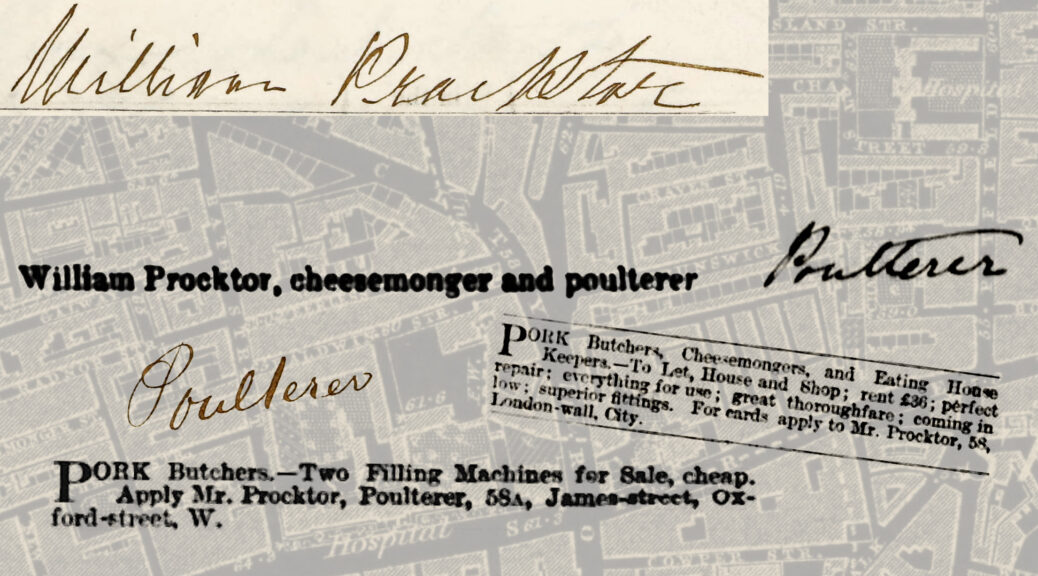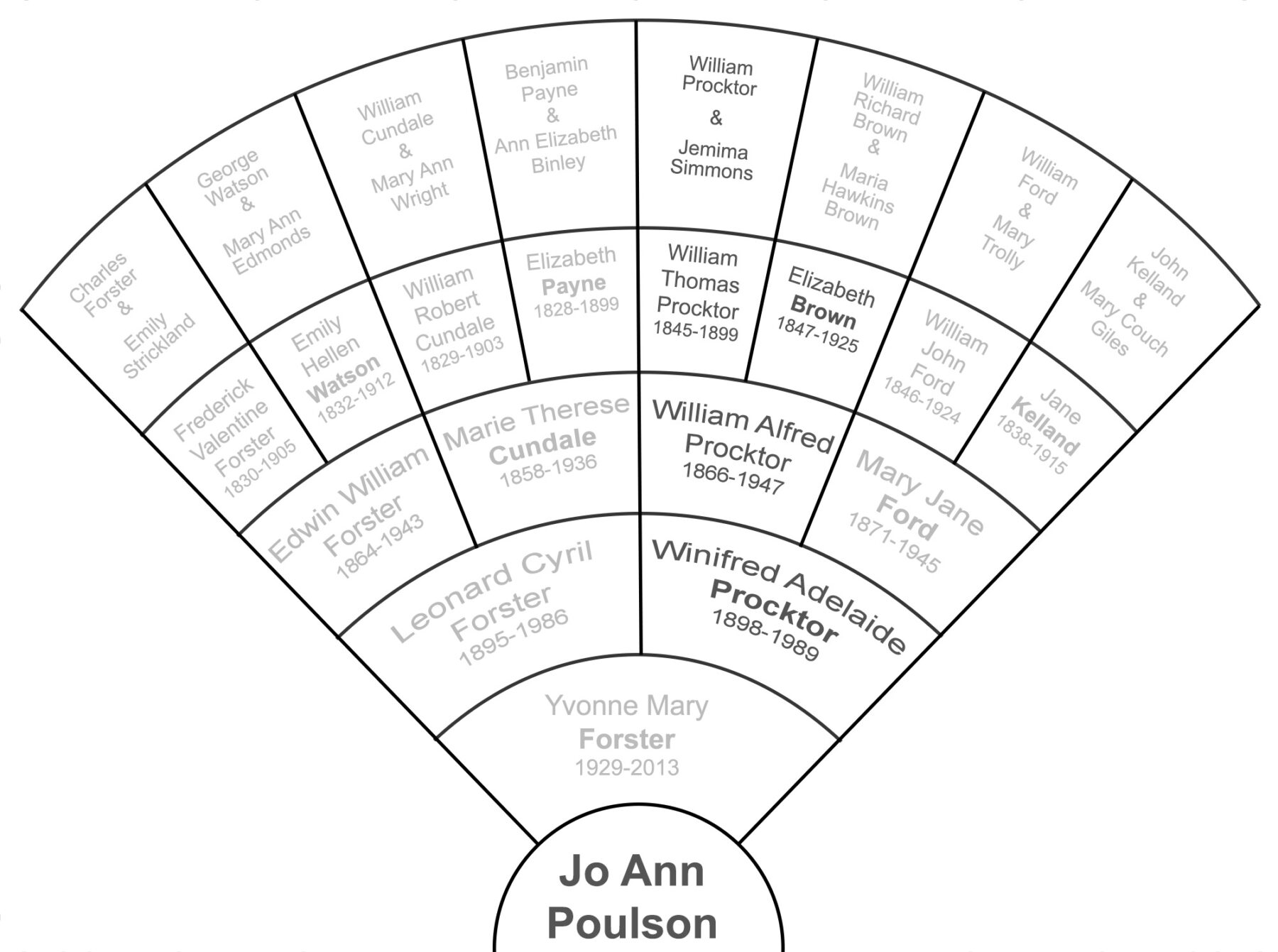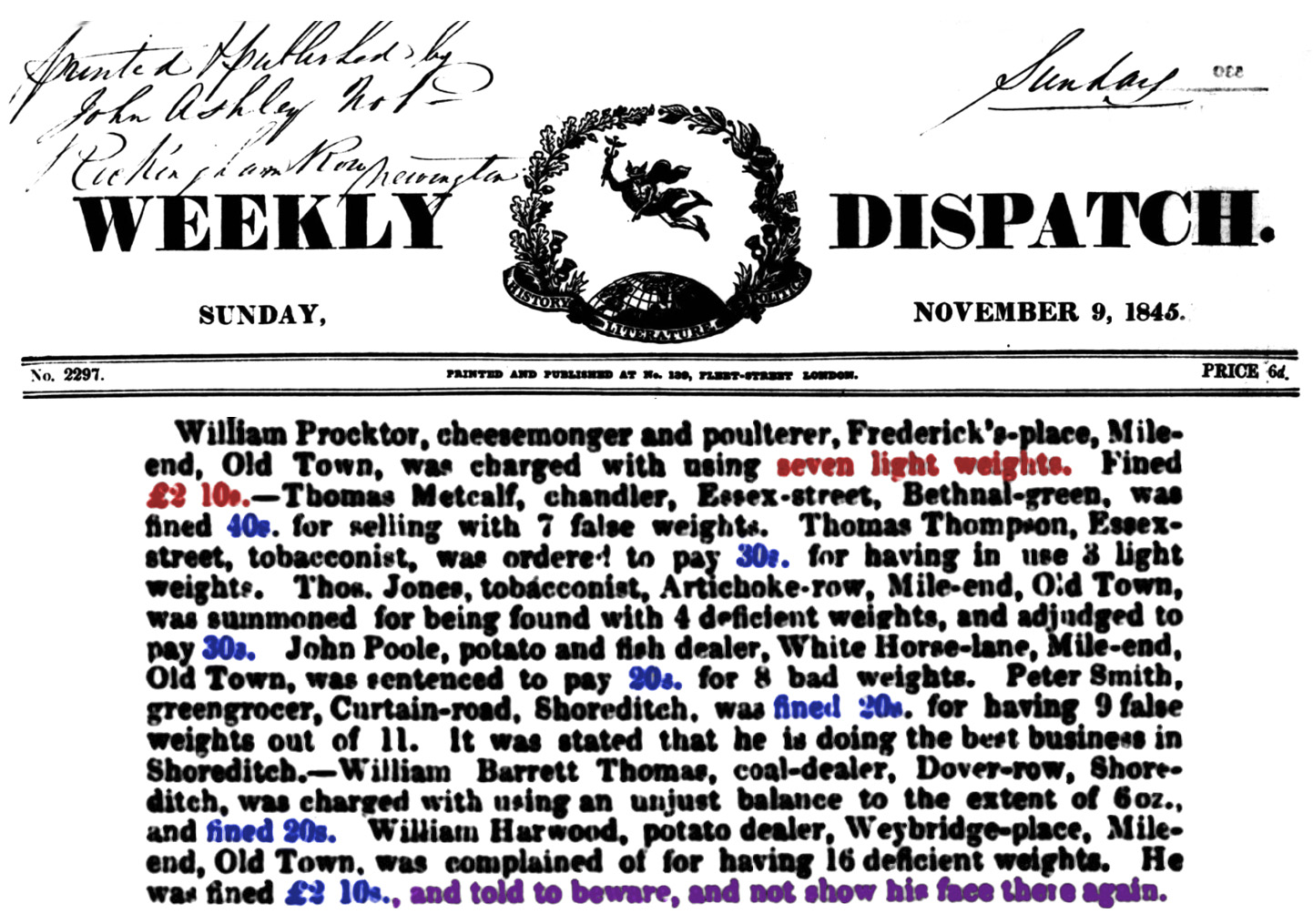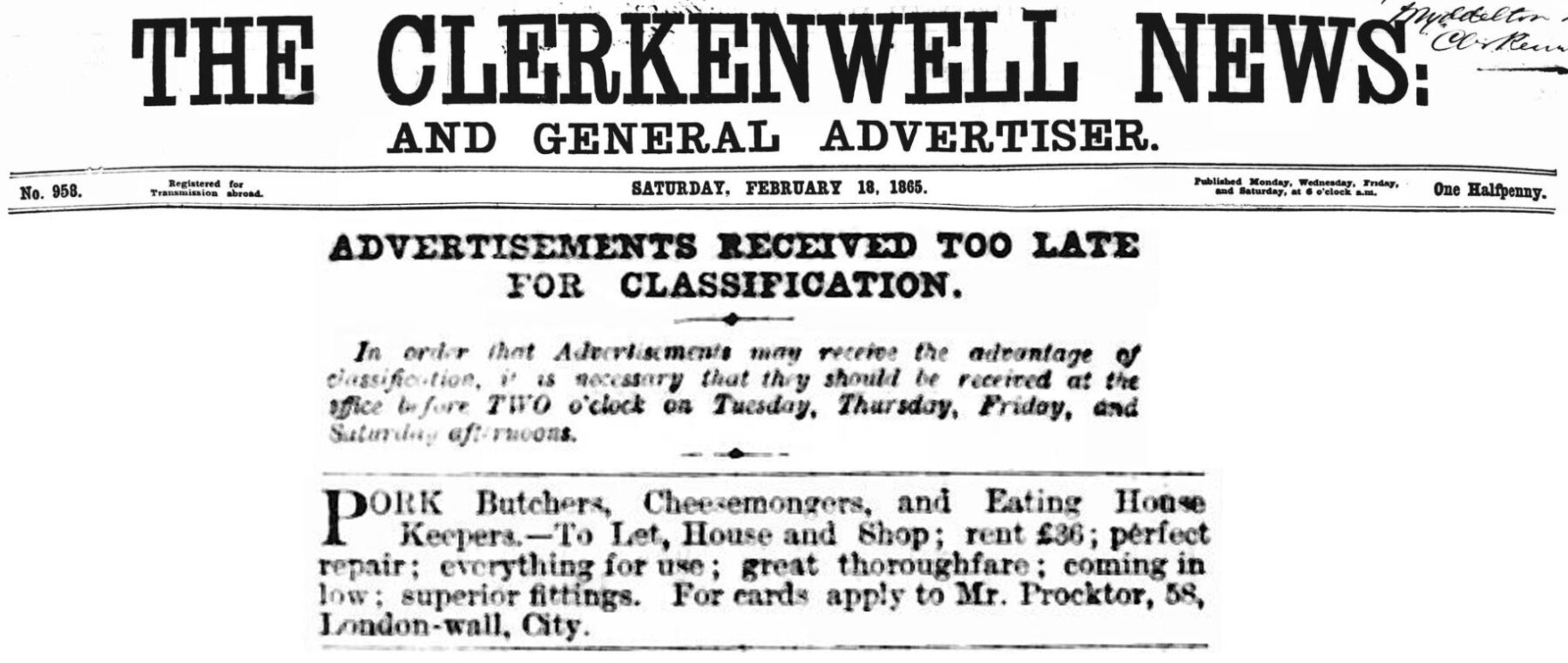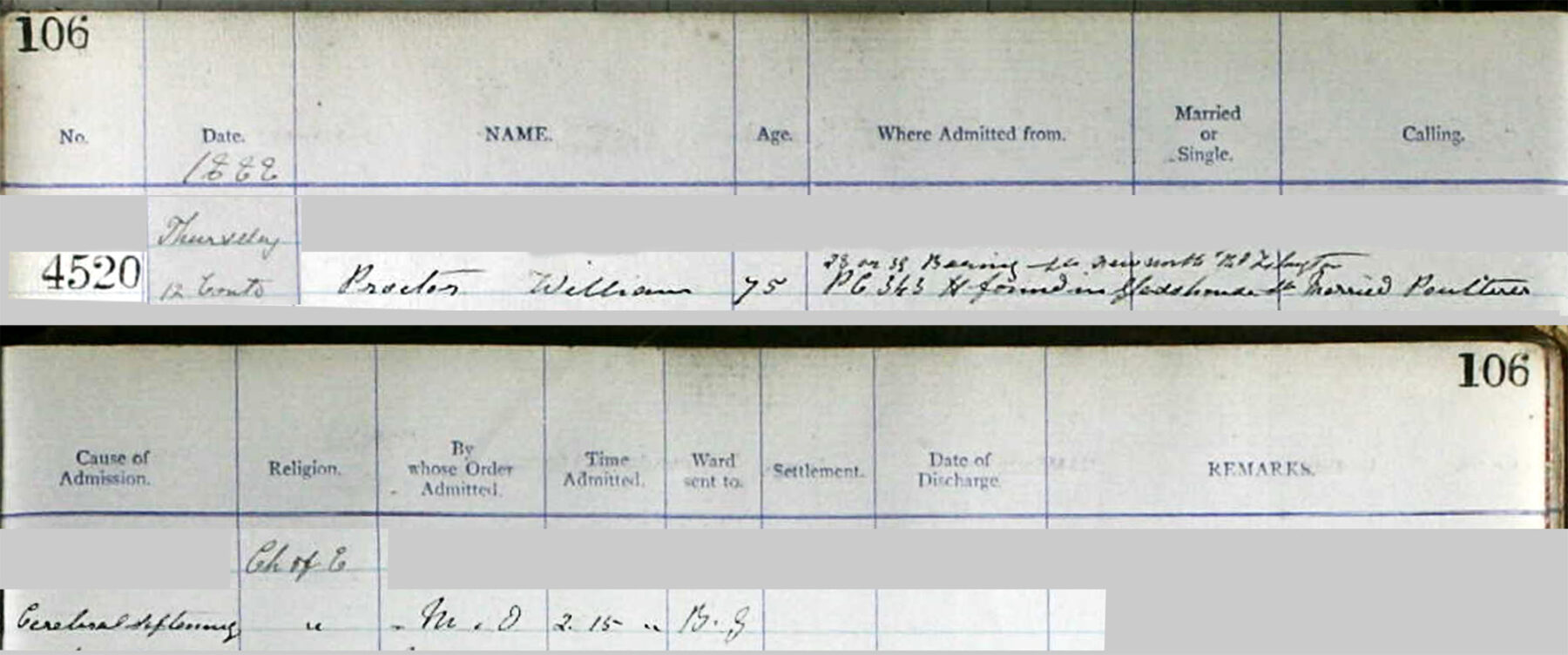The jobs you see in old census records sound so odd to 21st century ears. Some no longer exist – stay maker, maltster, lime burner – and some have changed so much they’re barely recognizable – tallow chandler (candle maker & dealer), cordwainer (shoe maker), braid picker (selecting & wrapping cord & ribbon), wheelwright (made & repaired wheels).
My 3rd great grandfather, William Procktor, was a poulterer – he sold game and poultry – in the middle of the 19th century in the East End of London – he moved around Stepney & Shoreditch and one of his locations was 58 London Wall, the road along the long gone city walls. His father was a mariner from Bermondsey and his children all moved “up” as best they could and did not follow their father into the business. London was a very different place by the end of William’s life.
Embed from Getty ImagesWhen putting the family tree together, I often check occupations, as well as location and relatives, to make sure I have the right people. A marriage certificate for William’s oldest son, Edwin William Procktor, a photographer, was how the occupation “Poulterer” first caught my eye. It sounds really odd when you say it out loud! As the line of work hadn’t shown up with any other family members – in any branch of the tree, let alone with William’s cabinet maker son and merchantile clerk grandson – I was curious. It was especially intriguing as he worked in the heart of London, not somewhere more rural -often a change of occupation happened when people moved to London in search of more/better work than in their original homes.
William’s baptism record from 1814 said his parents lived at Cherry Garden Street, Bermondsey and John was a mariner (probably in the coastal trade, but I haven’t been able to find out more about him). The 1841 census has William, age 27, as a married poulterer in the Hamlet of Mile End Old Town (no street addresses, just “Lower District” comprising Alfred Street and Terrace North and South) , father of two.
A newspaper story from 1845 presented another, less flattering, side of William – he had been fined for having light weights. Although there appeared to be a lot of cheating going on at that time – and some truly pathetic excuses offered the magistrates, such as it was rust or a competitor to his scale maker must have swapped the weights to discredit him, or ignorance of the rules about weights – these are the people in your community you’re cheating. As a magistrate said in another case when the defendant complained of the hardship a fine would bring “Don’t talk to me about hardship. You do not think of the hardship you inflict on the poor by robbing them in the shameful manner you do.” Another case found a business with two sets of scales, one for when they were selling and the other for when they were buying – both wrong, but in opposite directions. And then there was apparently a common trick of a nail under part of the scale to alter the result, or . . . lots of variations on the dog ate my homework. The fine for William equates to about £320 in 2022 terms.
In the 1851 census William & family have moved to 5 Mora Place, off City Road, and he is a “Poulterer & porkman” and by 1861 he is a Cheesemonger, 58 London Wall. As I understand game seasons, there were many rules against selling game out of season, so having other products makes sense. An ad for what I assume are his old premises appeared in 1865 – and the fact that it was in the “late” section, suggests William wasn’t a planner. An 1870 city directory shows yet another move to “58a James Street, Oxford St W” and in the 1871 census he’s there and a Master Poulterer. For those not familiar with London’s social hierarchy, a move to the West end is a move up. His oldest son, Edwin, the photographer, is also in the West end at 74 Edgeware Rd.
The other hint at social climbing comes from how his children list their father’s occupation on their marriage certificates. Edwin and William Thomas, 1864 and 1866, list “Poulterer” as does Marian Lucy in 1876. In 1877 & 1887, Jemima and Martha Ann list their father as “Gentleman” – generally meaning someone who didn’t work for a living because they were of “independent means”. The 1881 census clearly shows William is still working – he’s left the West end and is at 25 Canonbury St, Islington, and occupation is “General Provisions” versus poultry, pork or cheese.
It’s possible that the Whitechapel Infirmary entry for 12 Jan 1888 admitting a married 75-year-old poulterer called William Procktor for “cerebral softening” is someone else, but I’m reasonably sure it’s him. There’s a partially illegible note about where in Islington he was admitted from (most entries show an address). My best guess is “found in Glasshouse St” and that it was some type of dementia. From the above linked article: “In asylum admission documents, it is clear that “softening of the brain” was a term that could be used by doctors outside the asylum to refer to what they saw as a specific variety of mental disease“. If this entry is correct, then William spent about 3 years in the infirmary.
There’s an entry (with other family members) in a cemetery burial register for 29 Dec 1890 for W. Procktor. It’s a shame the names aren’t spelled out, but the other family members’ death dates are given and match separate records, so I think it’s very likely. The group included daughter Martha Ann who died two years earlier, wife Jemima (died in 1908) and son Christopher Richard, 1913. They are all in the Chingford Mount Cemetery (which is where son William Thomas was buried, separately). Widowed Jemima lived with her widowed daughter in Hackney – happily she stayed out of the workhouse after William’s illness and death.
As I mentioned in the beginning, family did not follow in William’s career footsteps: Edwin was a photographer, William Thomas a cabinet maker, Christopher Richard a clerk (docks and then a bank). Daughter Martha Ann married a laster/boot riveter (but died less than a year after her marriage; as she was 42, it’s unlikely it was in childbirth). Jemima married a man who was variously a butcher’s clerk, baker’s manager and a commercial traveller. Marian Lucy married a carpenter. No worries about fines for light weights in any of those lines of work!

